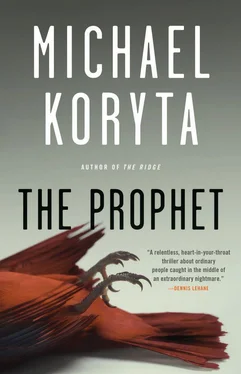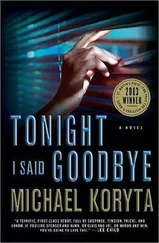Damn you, Adam. Damn you, damn you, damn you.
It was not hard to determine the proper cottage. Police tape and padlocks announced that. He walked to the edge of the porch but not onto it, just leaned against the railing with his hands on the weathered wood and stared at the door as the wind rippled by, pushing the low-lying branches of an untrimmed hemlock across the shingles of the roof, the sound like a broom on floorboards.
This was where she had died.
This was where he had sent her.
He looked at the door for a long time, wondering if she’d been greeted at it or if she’d had to knock. Did she hesitate? Did she even try to leave? How long had it taken her to realize how terrible a mistake she had made?
How terrible a mistake you made. You made it, Adam. Own that. Own it.
He turned from the door and blew out a long breath and studied the lake. Took out a cigarette and lit it and let the wind blow the smoke back into his face and sting his eyes. When it was half done he dropped it to the ground, stamped it out, and made his first circle of the cottage. The building was secured, but the police had not boarded the windows. That seemed foolish, seemed like something they would have wanted to do—or hang blackout curtains at least—but it helped him. Using the flashlight he could see into both of the bedrooms, most of the small living room and adjoining bathroom, and all of the kitchen.
The place was empty. Bare-bones empty, not so much as a blanket on the beds. Unless the police had carried everything out, it would have been empty when she arrived, too. So she had not been given time to run. It would have been over quickly for her. Part of it at least. The chance of escape. That had been gone fast.
He returned to the front porch and stared at the other cottages. They were close; two were within fifty feet, all five were within two hundred. A scream would have echoed through their paper-thin walls. But that would not have mattered, because they would have been empty. It appeared the entire place would have been empty when she arrived. A baited trap.
He didn’t give her the address, though. She had to find it. I had to find it.
The letters were just a game.
Maybe, Salter had said, he wasn’t that patient. Maybe, when she showed up at his door, it rushed him.
Adam smoked another cigarette there in the quiet and the cold and then he left to start things the right way.
11
IN THE FIRST TWO YEARS after his daughter’s death, Hank Austin had put on forty-five pounds. After-dinner beers became after-dinner twelve-packs. Morning coffees became morning Blood Marys. A half-pack of cigarettes a day became two packs, a slice of pizza became six, and on and on. Excess defined him. When the heart attack took him, it was an August afternoon with a heat index of 105 and he’d decided to sand the deck by hand.
When Adam found him, he felt relief amidst the sorrow and the shame. His father hadn’t been able to bear the loss, but he’d been a touch too strong to run from it, too. Just a touch.
Adam was twenty-two then, working as a bail agent in Cleveland. The one semester at Ohio State was a distant memory. Kent was a sophomore in college, a starting quarterback for a small but quality program. Adam was still living at home, if living was the right word. It was where he slept, from time to time. Usually during the day, when his parents were gone. He did most of his hunting at night. His boss loved that, and it suited Adam. He was a nocturnal sort.
After his father died, his mother moved into an apartment. It had been Adam’s suggestion.
You’re not happy here, he told her. There’s too much pain all around you. You know that.
She agreed. Moved into an apartment near the bank where she worked, and Adam stayed in the house. She remained in the apartment for nine years, and then the first stroke came, and a month later the second, and her final four years were in an assisted living facility. The house was left to Adam and Kent jointly, and Adam had three separate appraisals conducted and then offered his brother half of the average, a fair share.
Kent refused it. Told him they needed to sell the place not for money, but for purposes of moving on. Adam declined. Each month he sent his brother a check for what he deemed half of fair rent on the home. Each month the check went uncashed.
Once his father was dead and his mother had moved, Adam finally got the room back the way he wanted it. Hank Austin had been firm—the day Marie’s body was found, turning the inevitable into the official, he’d begun to pack her things away, working alone, no sounds but the shrieks and tears of the packing tape and the occasional soft sob.
Adam understood both the idea and its futility. It was tempting to try, maybe, but it was hopeless. You couldn’t put her into boxes and seal them shut.
The boxes had gone into the attic above the garage. Sometimes Adam would slip up there and go through the artifacts, handling them carefully, taking in the smell of her, amazed by how it lingered. He was alone with her then, felt close to her in a way he could not anywhere else, and he was certain that she was there with him, somehow aware of the communion and appreciative of it. They talked a little. He couldn’t get through much at first, the tears came too fast. Over time it got better. He apologized often—too often for her, he knew that, but how did you stop?—and he told her what news there was to share. He told her about every skip he tracked down, everyone who jumped bond and tried to hide. He got them all, he was remarkably diligent, his boss in Cleveland was already talking about turning the business over to him, but Adam wanted to come home. He wanted to be in Chambers County.
They talked about that, too. Whether maybe what he needed was exactly the opposite, what he needed was to get out. In the end, though, that just didn’t feel right. The debt Adam owed had been left here on Beech Street in Chambers, Ohio. There were advantages to leaving town—the stares wouldn’t follow him in other places, the whispers would never be heard, no one would remember because no one would know. Sometimes that seemed so beautiful, so desirable, that it could nearly bring him to his knees. But he would not run, and that was all it amounted to. Those stares, those whispers, those memories? Adam had earned them. They were necessary reminders, needles of agony that refreshed the heart and kept him focused. He was here to offer atonement. That was not a painless task, and it was not one from which you could run.
He made some promises, up there in the attic surrounded by the boxes that testified to a vanished life. He intended to keep them.
When the house was his, no one left to object to a little rearranging, Adam moved Marie back in. It was a painstaking process. The large objects were no problem, he remembered where they belonged, but on smaller issues, the order of the books on the bookshelves, the arrangement of posters on the walls, he had to stop and think and, sometimes, simply ask for her approval, apologize, and put the things where they seemed to fit. He had not paid enough attention to the details when he’d had the chance, but he was certain that Marie understood and forgave him.
When he was done, when he’d hung her sign on the door, the last step, he felt cleaner than he had in years. She would not be boxed away, would not be forgotten.
Kent had problems with it. That had been one of their true blowups, second-to-last of the effective end of their relationship. He came in and saw the room and said it was a sick thing to do, that Adam needed help, needed to learn how to move on, and that there was no honor for Marie in what he’d done. They’d disagreed strongly on that point. Then came Kent’s visit to Gideon Pearce. Adam found out about that in the papers. He’d gone to Kent’s house, and would always regret that. He shouldn’t have allowed it to happen with Beth present. That argument ended with blood. Since then, they’d circled each other with carefully preserved distance.
Читать дальше












